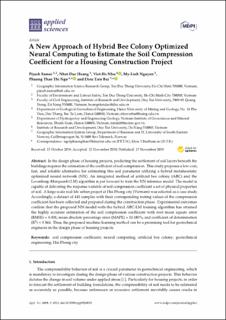A New Approach of Hybrid Bee Colony Optimized Neural Computing for Estimation of Soil Compression Coefficient for Housing Construction Project
Peer reviewed, Journal article
Published version
Permanent lenke
https://hdl.handle.net/11250/2648253Utgivelsesdato
2019Metadata
Vis full innførselSamlinger
- Institutt for økonomi og it [161]
- Publikasjoner fra CRIStin [3623]
Originalversjon
Samui, P.; Hoang, N.-D.; Nhu, V.-H.; Nguyen, M.-L.; Ngo, P.T.T.; Bui, D.T. (2019). A New Approach of Hybrid Bee Colony Optimized Neural Computing to Estimate the Soil Compression Coefficient for a Housing Construction Project. Appl. Sci., 9(22), 4912. 10.3390/app9224912Sammendrag
In the design phase of housing projects, predicting the settlement of soil layers beneath the buildings requires the estimation of the coefficient of soil compression. This study proposes a low-cost, fast, and reliable alternative for estimating this soil parameter utilizing a hybrid metaheuristic optimized neural network (NN). An integrated method of artificial bee colony (ABC) and the Levenberg–Marquardt (LM) algorithm is put forward to train the NN inference model. The model is capable of delivering the response variable of soil compression coefficient a set of physical properties of soil. A large-scale real-life urban project at Hai Phong city (Vietnam) was selected as a case study. Accordingly, a dataset of 441 samples with their corresponding testing values of the compression coefficient has been collected and prepared during the construction phase. Experimental outcomes confirm that the proposed NN model with the hybrid ABC-LM training algorithm has attained the highly accurate estimation of the soil compression coefficient with root mean square error (RMSE) = 0.008, mean absolute percentage error (MAPE) = 10.180%, and coefficient of determination (R2) = 0.864. Thus, the proposed machine learning method can be a promising tool for geotechnical engineers in the design phase of housing projects.

